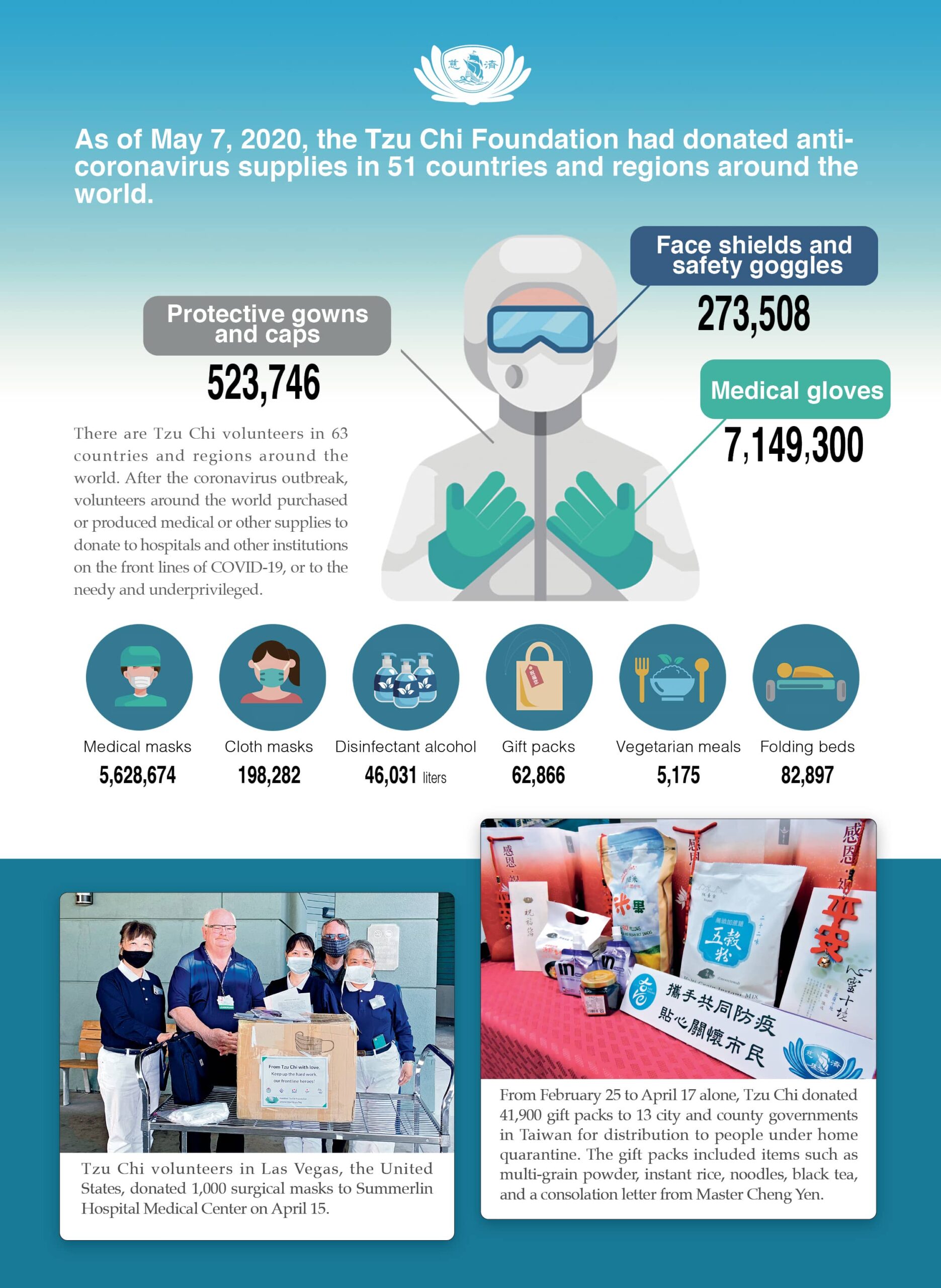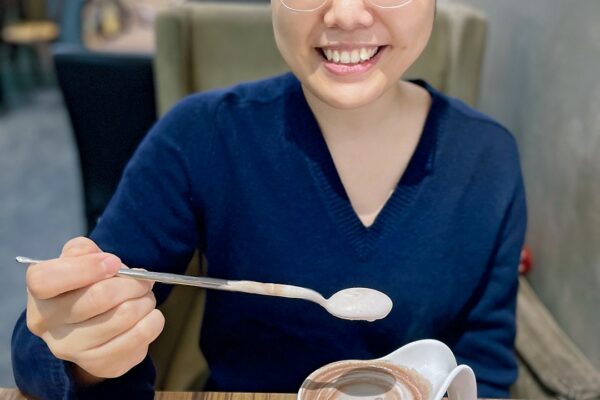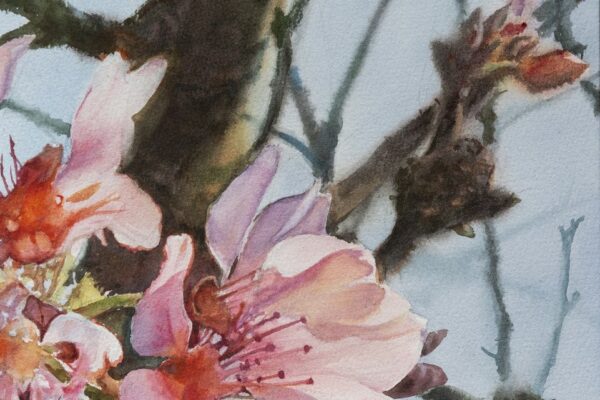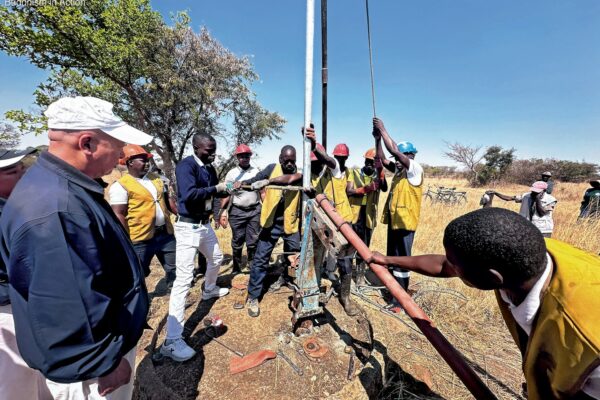Tzu Chi volunteers in Malaysia swung into action to fight COVID-19 by making severely needed medical supplies, including face shields and protective gowns, for hospital workers. The volunteers’ efforts helped ensure the safety of frontline medical workers as they worked to save lives.
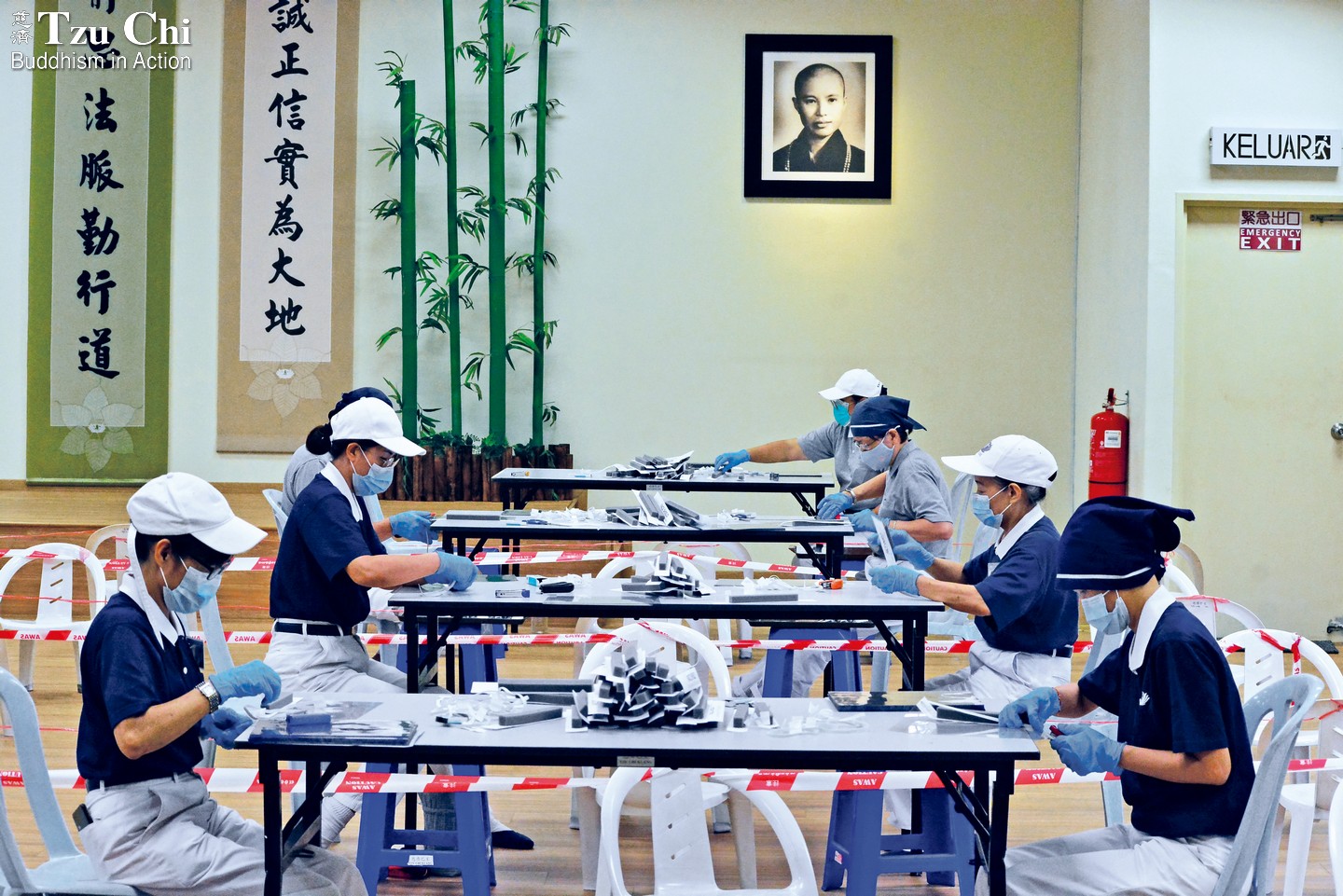
Volunteers at the Tzu Chi Klang office in Malaysia make face shields for healthcare professionals. To maintain adequate physical distance between volunteers, only two persons were permitted at each table, and tables themselves were separated by cordons. All finished products had to pass inspection by members of the Tzu Chi International Medical Association before they could be donated. Volunteers in Malaysia have made over 160,000 face shields during the coronavirus outbreak. LEE WEI KEAN
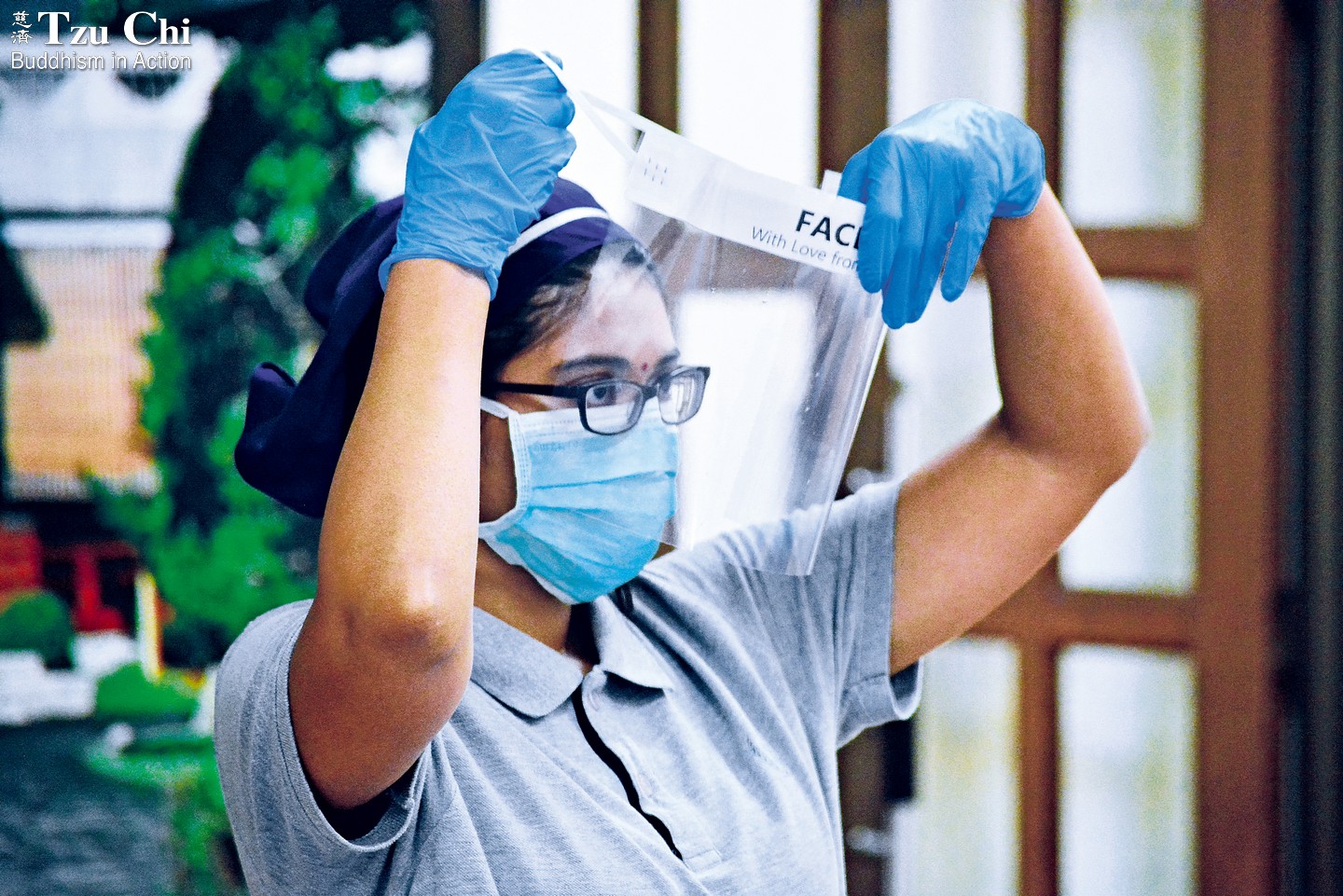
Making the Best Preparations
By Tang Jia Ruey
Compiled and translated by Wu Hsiao-ting
Several months have passed since the coronavirus disease first broke out in China. The virus has affected hundreds of countries and territories around the world and led to hundreds of thousands of deaths. The first confirmed coronavirus case in Malaysia was diagnosed on January 25, just a few days before the World Health Organization declared the outbreak a “public health emergency of international concern.” That first patient in Malaysia was from China. On February 3, the first Malaysian citizen tested positive for the infection. The number of reported cases remained relatively low until late February when infections began to increase sharply. By mid-April, close to 5,000 COVID-19 cases had been diagnosed in the nation.
Facing the rapidly spreading disease, hospitals across the country rushed to prepare for the worst. Ching Chen Hua (莊菀佳), deputy CEO of Tzu Chi Kedah, is a nephrology physician at Kedah General Hospital. After the outbreak emerged, she became a member of the anti-coronavirus team at the hospital. Her job was to ensure that the hospital had an adequate stockpile of medical supplies to cope with the outbreak. This was, as could be imagined, no easy mission.
Something even money can’t buy
Hospitals generally maintain stockpiles of medical masks and gloves for the daily use of their medical workers. Face shields, however, are another matter. Since occasions calling for their use are rare, manufacturers don’t usually mass-produce them.
In a pandemic like COVID-19, however, face shields are of critical importance for doctors and nurses. A face shield is usually worn along with a face mask and isolation gown to protect a medical professional’s eyes, nose, or mouth from being splattered by a patient’s infected sputum or body fluids. This is especially needed when the professional is intubating or collecting respiratory samples from a patient. Because face shields help cut down on the chance of infection, it was a matter of course that the demand for them surged after the coronavirus began to spread.
Face shields, like other items of personal protective equipment, can only be used once. After the outbreak, manufacturers couldn’t produce them fast enough for those who needed them, and as demand rose, so did the prices. A shield that previously sold for three Malaysian ringgit (US$0.69) before the emergence of COVID-19 spiked at 16 or even 20 ringgit (US$4.57).
The high demand for face shields and the resulting shortage had Dr. Ching wringing her hands. Hospital staffers took to making the protective gear themselves during their breaks at work, but the amount they could produce was far from enough to meet the demand. Seeing that, Ching turned to her fellow Tzu Chi volunteers for help. They pledged their full support.
The medical team at Kedah General Hospital was overjoyed when they heard the news that Tzu Chi could help. Dr. Ching first learned how to make a face shield herself, then discussed and collaborated with other Tzu Chi volunteers on how to improve the design. After they had worked out the prototype, Ching proposed making the shields at the Tzu Chi Jing Si Hall in Kedah. To protect volunteers from picking up the virus, the number of participants was kept at a minimum—ten each day. Thirteen hundred face shields could be produced every day with that number, which was enough to temporarily relieve the shortage at the Kedah hospital.
On March 18, the Malaysian government started a nationwide Movement Control Order to curb the spread of the coronavirus. The order prohibited people from leaving their homes freely, which naturally also limited the movement of Tzu Chi volunteers. To keep the production of face shields up, Kedah’s health authorities quickly issued movement permits to volunteers involved in making the face shields. In the end, Tzu Chi volunteers were allowed to continue going to the Jing Si Hall to assist in the production.
Tzu Chi volunteers’ efforts in making face shields for Kedah General Hospital quickly spread. Though many government and private medical clinics were not among the facilities designated by the government to screen and treat COVID-19 patients, many medical workers there still feared for their safety. After all, workers at these sorts of facilities were still at risk of encountering asymptomatic carriers of the virus. A Tzu Chi volunteer working at a government health clinic asked Dr. Ching if Tzu Chi could provide three face shields for workers at her clinic. Ching took into consideration that the clinic was in a remote area and it took a long time to travel there, so she gave the clinic a hundred face shields.
In addition to this generous act of giving, Ching asked the volunteer to contact other government clinics and pass the word that Tzu Chi would provide them with as many face shields as they needed, regardless of the locations of their clinics.
Many government clinic employees also made inquiries on how to make face shields on their own. In response, staffers at the Tzu Chi Kedah office made an instructional video and made it available online to share the production techniques with more people.
News of the face shields continued to spread. Ching received phone calls from doctors of private medical and dental clinics telling her that they hadn’t opened their practices for 14 days due to the outbreak, and that their employees were afraid to show up for work. They hoped that Tzu Chi could give them some face shields so that they could work at ease.
The doctors couldn’t stop thanking the foundation for their help after receiving Tzu Chi’s face shields. Ching was deeply moved by their responses. She said that Master Cheng Yen once said that if we wanted to help others, we had to go all the way and deliver enough help to make a difference. The physician sincerely hoped that the support from Tzu Chi could help keep healthcare professionals safe and enable them to work with fewer concerns during the pandemic.
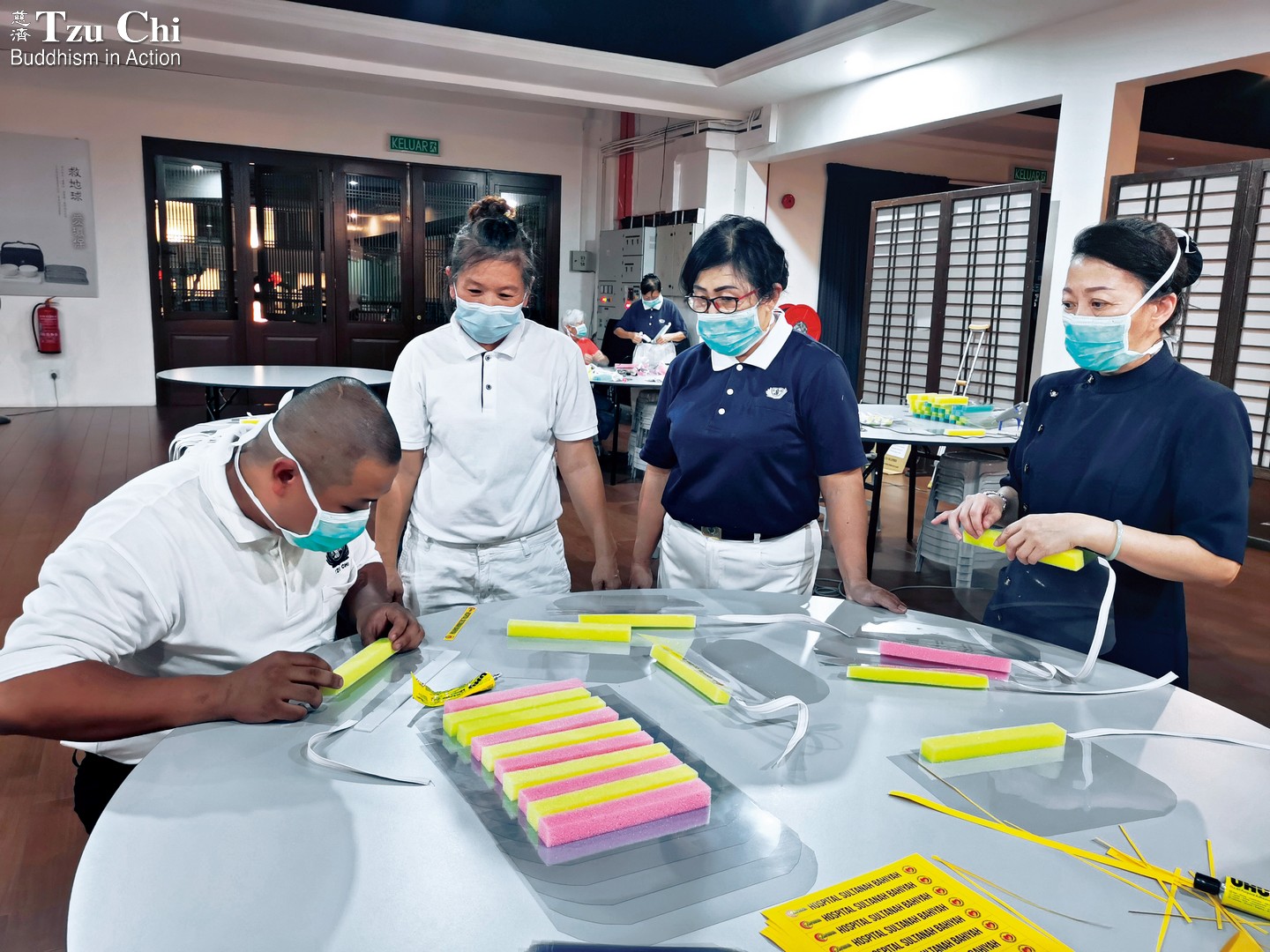
Dr. Ching (first from right) works with Tzu Chi volunteers on improving a face shield prototype, using staplers, superglue, sponges, adhesive tape, and clear plastic films. In addition to Tzu Chi facilities, volunteers also gathered in open factory spaces provided by volunteers to make the face shields. Volunteers who lived close to each other also got together and, with each responsible for a specific task, formed mini-production lines to turn out face shields. COURTESY OF TZU CHI KEDAH
One More Layer of Protection, More Peace of Mind
By Chong Yoon Ming and Lau Poh Ling
Translated by Wu Hsiao-ting
Photo courtesy of Chong Yoon Ming
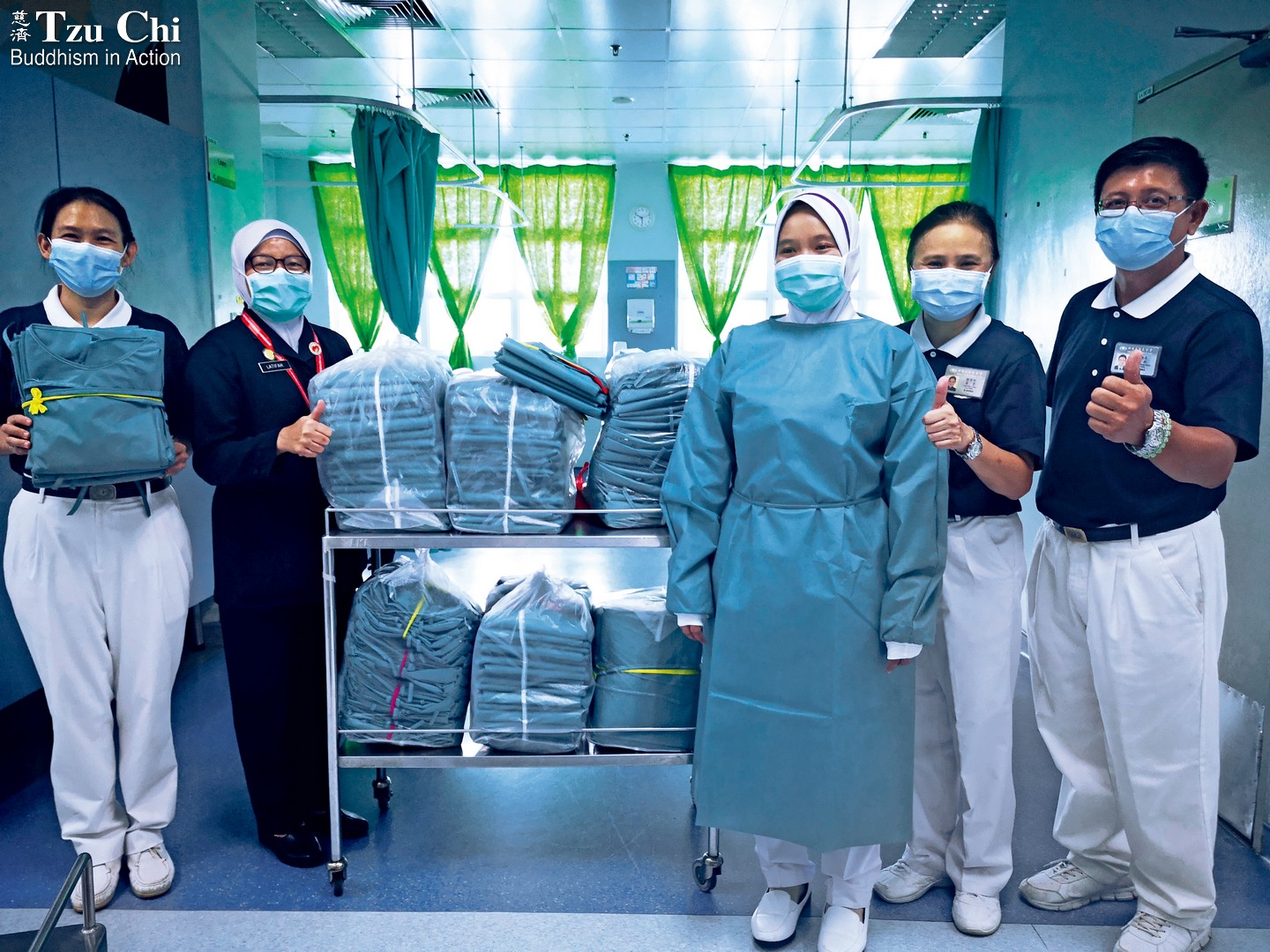
Late in the afternoon on March 25, Tzu Chi volunteer Liong Pei Chin (梁佩君) arrived at Kluang General Hospital to pick up a protective gown as a sample. While there, she saw nurses sewing protective gear, such as head and shoe covers. They were working on sewing machines they had brought from home. Her heart went out to them for their effort and dedication.
After obtaining the sample gown and materials provided by the hospital, volunteers in Kluang immediately set out to discuss and decide on the production procedure. The following day, volunteer Chee Kok Cheng (徐國貞) mobilized several employees from her garment factory to join the production team. Chee Kok Hin (徐國興), a tailor, said, “This is the first time I’ve had an opportunity to do something for my country. Such an opportunity is hard to come by. I hope the protective garments we make will provide an extra layer of protection for medical workers and bring them more peace of mind at work.”
Volunteers made 132 protective garments in eight hours. The first batch of clothing was shipped off to Kluang General Hospital less than a day after volunteers obtained the sample and materials. When they arrived, the garments definitely boosted the morale of medical workers at the hospital.
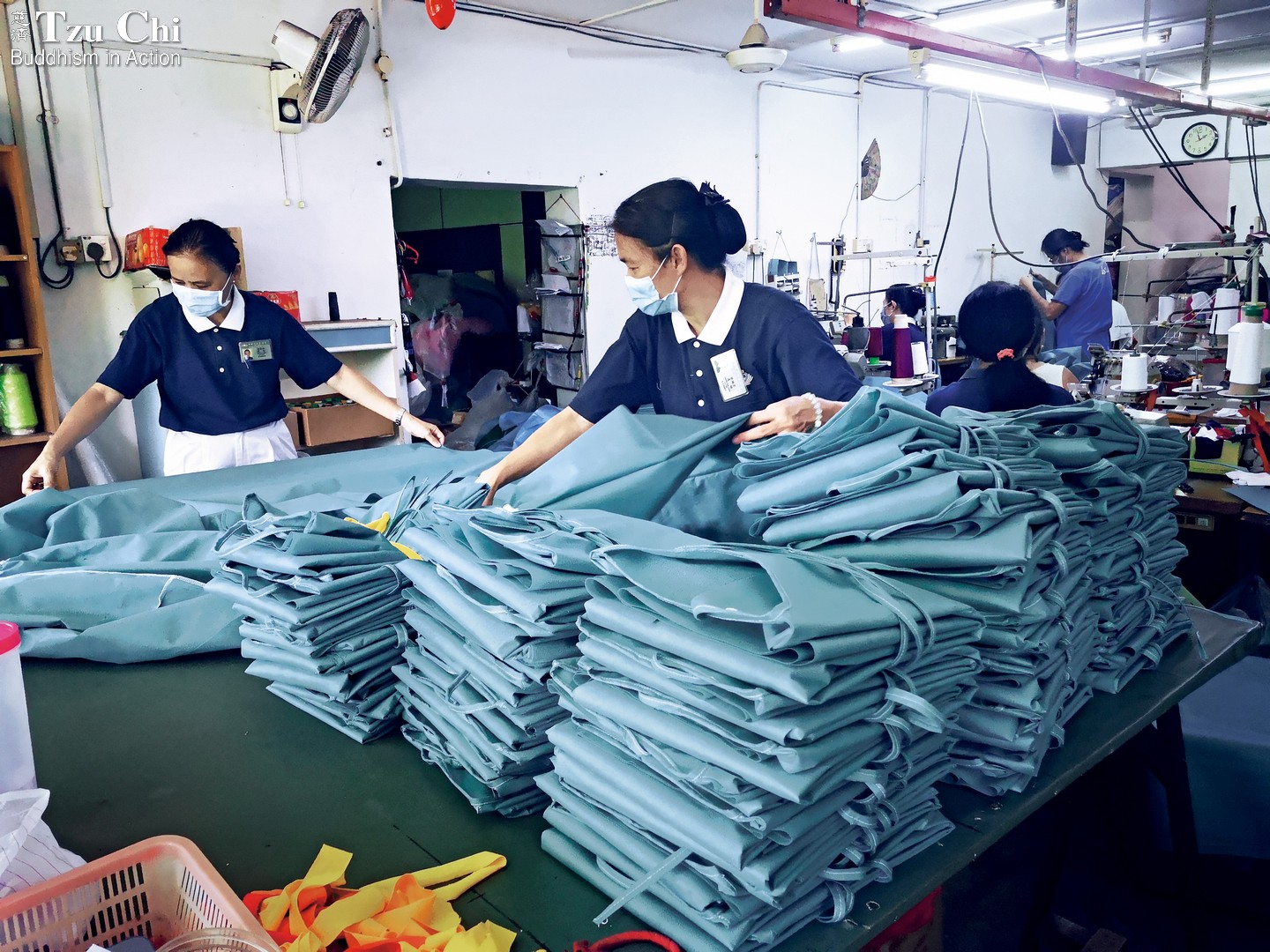
CHONG YOON MING
Delivering Materials During the Movement Control Order
By Cecelia G. C. Ong
Translated by Wu Hsiao-ting
Photos by Lim Choon Nyak
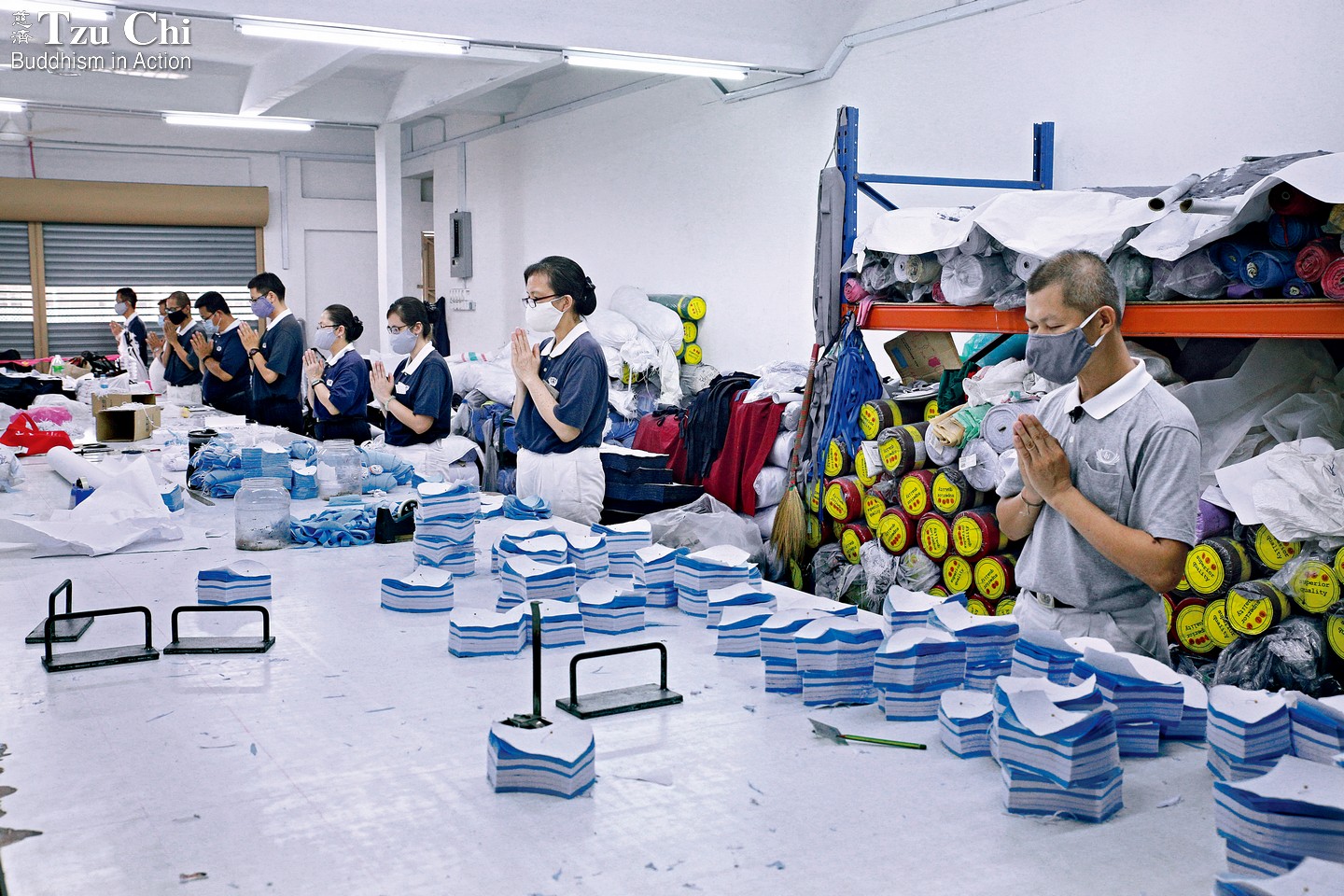
On March 29, volunteers gathered at a volunteer’s factory in Bukit Mertajam, Seberang Perai, in the state of Penang. They used the equipment there to cut pieces of fabric for cloth masks. Their efforts were to help ensure that healthcare workers would have enough medical masks for their needs.
At 1:30 in the afternoon, everyone stopped what they were doing and joined a daily prayer event launched by Tzu Chi headquarters in Hualien, eastern Taiwan, to pray for the peace and well-being of the world.
Volunteer Quah Soo Chung (柯濟沅) helped coordinate the production of cloth masks and protective clothing by his fellow volunteers. He also delivered pre-cut pieces of fabric to volunteers’ homes for sewing into masks and protective gowns. The photo below shows him being stopped by a police officer during one of his delivery trips. The officer was on duty enforcing the Movement Control Order. When he learned why the volunteer was out and about, he let him pass.
About the Movement Control Order
The Malaysian government initiated the order as a preventive measure in response to the coronavirus outbreak. The content of the order included:
- Prohibition of movement and mass assembly nationwide
- Individuals could leave their homes to purchase daily necessities or food or seek medical treatment but were not allowed to move beyond a radius of ten kilometers (six miles) from their residences. Only one person was allowed in a vehicle.
- Any person wishing to do charitable work must first obtain permission.
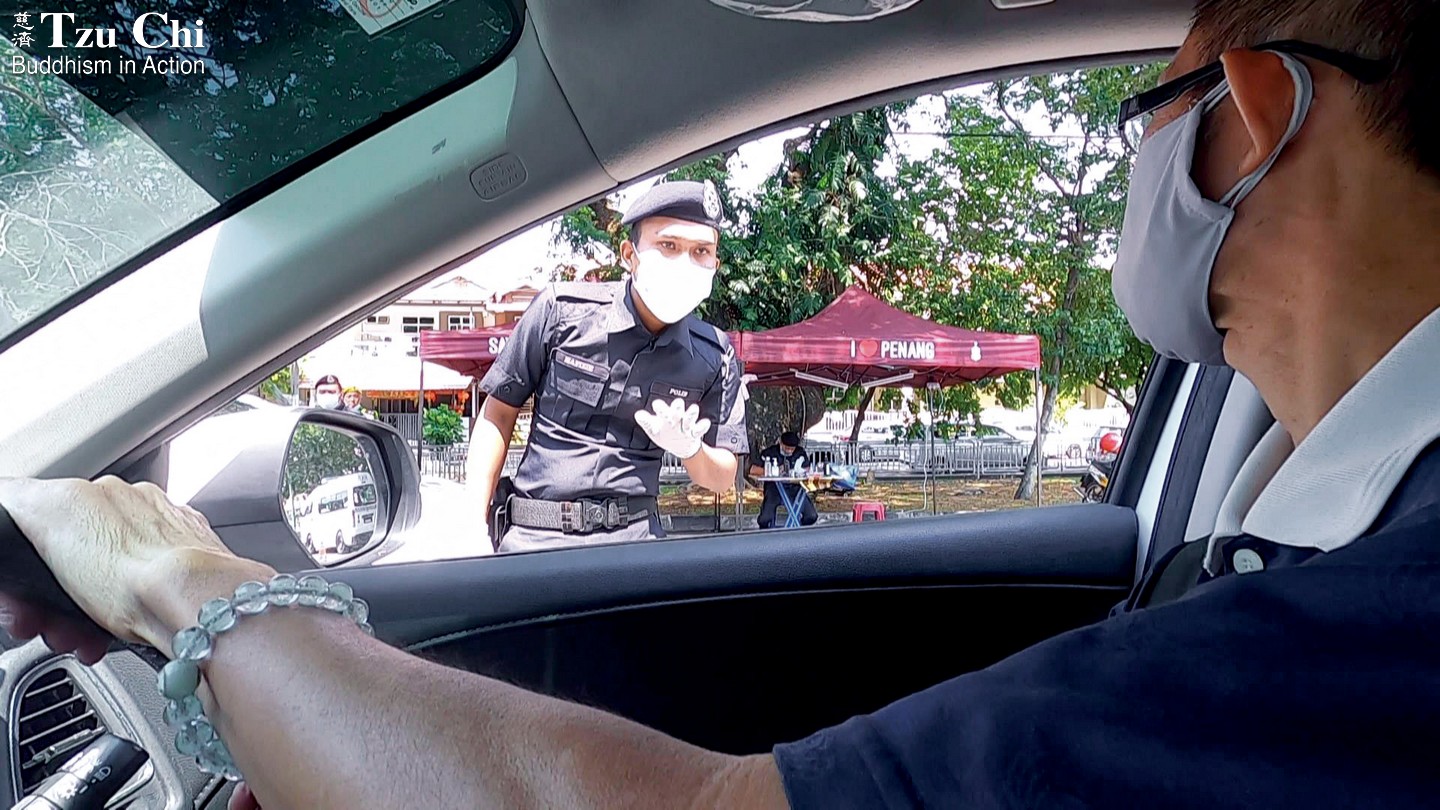
Delivering Food to Refugees to
Help Them Through a Difficult Time
By Lim Li Tian
Translated by Wu Hsiao-ting
Photos by Leong Chian Yee
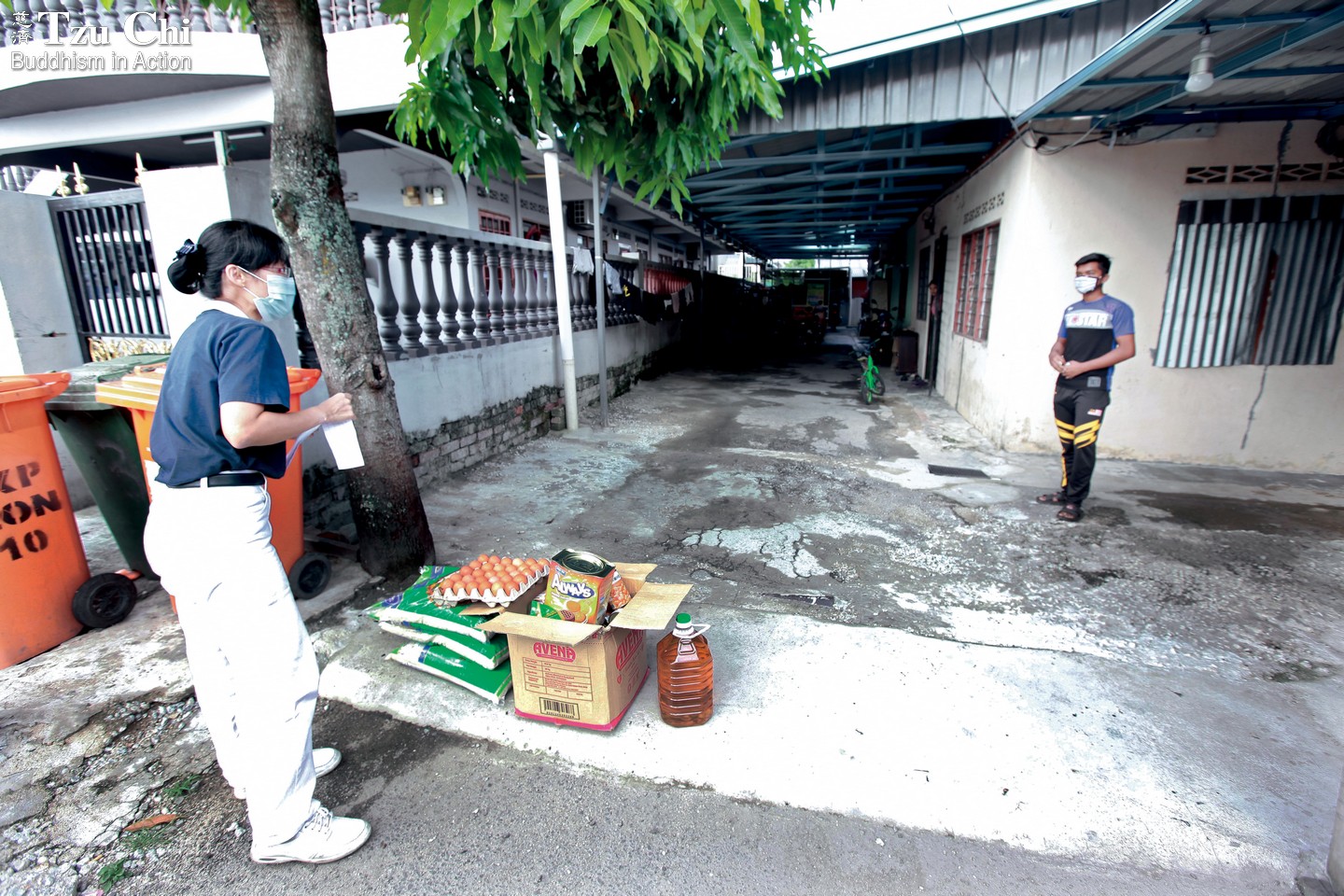
Many refugees in Malaysia were forced out of work after the government’s Movement Control Order went into effect. No work meant no food for many of them. After learning of the situation, Tzu Chi volunteers took action to help.
On March 25, volunteers delivered food to 40 families whose children were attending two refugee schools co-founded by the United Nations High Commissioner for Refugees (UNHCR) and the Tzu Chi Kuala Lumpur and Selangor branch. Dr. Foo Seay Liang (符之良), UNHCR-Tzu Chi Project Coordinator of the Tzu Chi branch, said, “We received phone calls from students telling us that their families had run out of food. Some had even gone hungry for several days. We immediately launched an emergency distribution.” After deciding on the amount and varieties of food to distribute, volunteers quickly arranged for the purchase and transportation of food to the 40 families. Each family received 12 kinds of food, enough for a month, including rice, flour, noodles, biscuits, eggs, and cooking oil. The supplies weighed nearly two tons before being parceled out.
Chan Bee Peng (曾美萍), a Tzu Chi employee who helped deliver the food, said, “There were road blocks on our delivery trips, and we encountered police officers on our way too. Fortunately, we had movement permits issued by the government; otherwise we wouldn’t have been able to pull off the mission.” To protect themselves and the recipient families from infection, volunteers were vigilant to maintain social distancing. Instead of delivering food into refugees’ homes, they asked the refugees to come outdoors to receive the food items.
Dr. Foo believed that more refugees would be needing charitable and medical aid from Tzu Chi on account of the outbreak, and volunteers had started working on it. “We’ll be sure to take precautionary measures when we reach out to help,” Foo said. “In a time like this, we Tzu Chi volunteers must step forward and do what Master Cheng Yen wants us to do.”
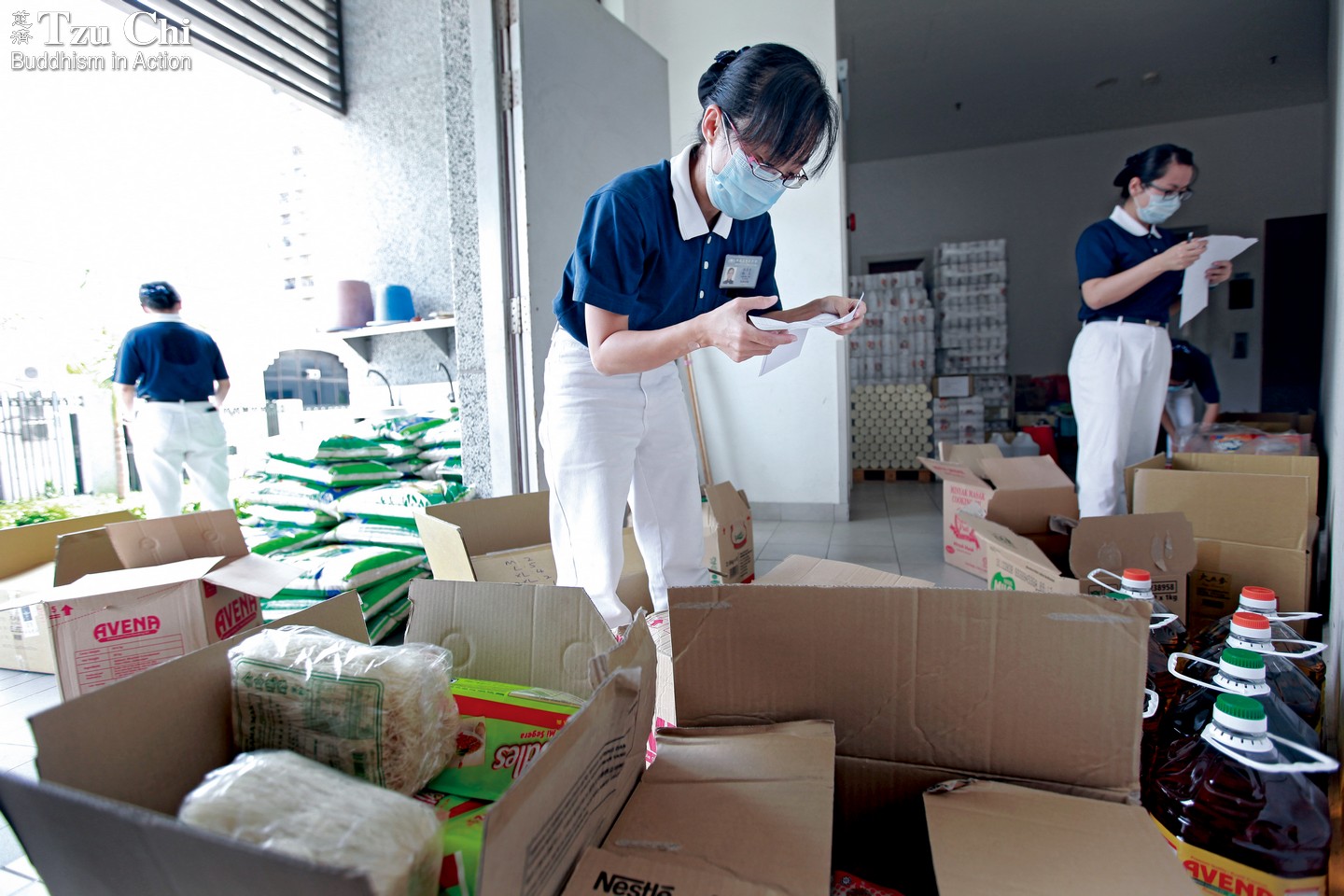
●
